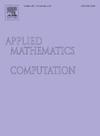高阶非标准有限差分法
IF 3.4
2区 数学
Q1 MATHEMATICS, APPLIED
引用次数: 0
摘要
非标准有限差分(NSFD)方法被认为克服了标准方法的一些问题,特别是当数值解必须保持精确解的重要性质时。对于高阶方法,这些问题会增加。本文首先推导了获得无条件正二阶NSFD方法的一般过程。此外,通过在这些格式中适当地加入一些参数αi,我们证明了它仍然有可能得到正性,并且还保留了精确解的其他定性性质。事实上,对于每一个特定的问题,我们都可以得到αi的最优值,保证了正性、初等稳定性和局部截断误差的最小化,也可以实现文献中没有的三阶非标准格式。作为一个应用实例,我们利用所开发的理论推导出捕食者-猎物模型的一阶、二阶和三阶正稳定NSFD方法,显示了它们相对于文献中其他非标准方法的优势。本文章由计算机程序翻译,如有差异,请以英文原文为准。
High order nonstandard finite-difference methods
Nonstandard finite difference (NSFD) methods have been considered to overcome some issues of standard methods, particularly when the numerical solution must preserve important properties of the exact solution. These issues increase for high order methods.
In this paper we first derive a general procedure to obtain unconditionally positive second order NSFD methods. Furthermore, by suitably adding some parameters within these schemes, we show that it is still possible to get positivity, and also to preserve other qualitative properties of the exact solution. In fact, for each particular problem we can get optimal values of that guarantee positivity, elementary stability and the minimization of the local truncation error, being possible to achieve also third order nonstandard schemes, which are not present in the literature.
As an example of use, we employ the developed theory to derive positive and elementary stable NSFD methods of order one, two and three for a predator-prey model, showing their advantages over other nonstandard methods from the literature.
求助全文
通过发布文献求助,成功后即可免费获取论文全文。
去求助
来源期刊
CiteScore
7.90
自引率
10.00%
发文量
755
审稿时长
36 days
期刊介绍:
Applied Mathematics and Computation addresses work at the interface between applied mathematics, numerical computation, and applications of systems – oriented ideas to the physical, biological, social, and behavioral sciences, and emphasizes papers of a computational nature focusing on new algorithms, their analysis and numerical results.
In addition to presenting research papers, Applied Mathematics and Computation publishes review articles and single–topics issues.

 求助内容:
求助内容: 应助结果提醒方式:
应助结果提醒方式:


